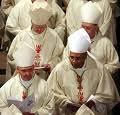A COLLECTION OF VIEWS ABOUT THE AMERICAN BISHOP’S LAWSUIT OVER ARTIFICIAL CONTRACEPTION
Commonweal Magazine in its June 15th issue had a discussion by several Catholic theologians on the Bishop’s lawsuit over the health care act provisions relating to birth control contraceptives and their position paper the Bishops entitled "Our first, most cherished liberty." Here are excerpts from the articles.
One point the writers made is that unlike the apparent belief of the Bishops, religious freedom is not an absolute freedom. Here are some observations made about that fact.
 While freedom of religion is indeed a most cherished in the United States, it is far from absolute – even in core matters of worship. Free exercise doesn't entail the right to conduct a loud revival meeting in a residential neighborhood at 2 AM. Nor will extend to human sacrifice. It is a mistake for the Pope (or anyone else) to speak of “freedom of religion" as a fixed concept in American culture or constitutional law.
While freedom of religion is indeed a most cherished in the United States, it is far from absolute – even in core matters of worship. Free exercise doesn't entail the right to conduct a loud revival meeting in a residential neighborhood at 2 AM. Nor will extend to human sacrifice. It is a mistake for the Pope (or anyone else) to speak of “freedom of religion" as a fixed concept in American culture or constitutional law.
The most striking aspect of the bishop’s claims about religious liberty is the absolute nature of their assertions – they don't really make arguments. American law does not treat religious freedom as an absolute right. It has to be balanced against competing state interests. The 1982 case of the United States versus Lee held that it was constitutionally permissible for the federal government to force Amish employers to pay Social Security taxes although both the payment and taxes violated their religious beliefs.
Another point the writers made was the problem of determining what should be exempt on religious grounds.
Should northern Arapaho Native Americans who need bald eagle feathers for religious rituals be exempt from restrictions on hunting those birds off the reservation in Wyoming? Should all our Orthodox Jews who believe they cannot report cases of sexual abuse of minors to civil authorities without rabbinical approval be exempt from New York's reporting laws?
They also found problems with regard to the Bishops discussion about responses that require conscientious objection,
The bishops emphasize the distinction between righteous objection and an unjust law. Most human laws fall short of perfect justice and are in some respects unjust. Are we required to disobey all of them? There are many Catholics who believe that the Republican budget the House of Representatives recently endorsed imposes unacceptable burdens on the poor and violates core principles of social justice. If that budget were to become law, would Catholics be required to disobey it? We participate in evil to some extent whenever our tax dollars support activities that violate what is just and right. Are we obligated to stop paying taxes?
They also note the lack of support by Catholics for the Bishop’s position that artificial birth control is intrinsically evil.
A recent survey by the public religion research Institute found substantial majorities of Catholics in favor of requiring religiously affiliated social service agencies, colleges, and hospitals to provide their own ploy ease with healthcare plans that cover contraception or birth control at no cost. Here, as with same sex marriage, the shepherds no longer control their flock. There is no reason to believe this will change anytime soon.
The bishops condemn contraception, but few Catholics pay them any mind, and most Americans find the Catholic teaching incomprehensible. What the bishop’s view as seriously sinful, many Americans or most Americans view as fundamental human rights. Many Americans on the other side of these issues now view the bishops as powerful forces for evil.
The theologians noted the fact that the Bishops want more than an exemption. They want to change American laws to conform to their view of moral laws.
The bishops tend to frame their complaint in terms of religious liberty. Yet most religious liberty cases involve minority religious groups seeking to be left alone to pursue holiness as a see fit and do not try to influence the broader community nor to recast American society in their own image. But the bishops do not want to withdraw into a secretarian corner. They want to participate more broadly in American life and sheep American laws with their own values
The theologians also noted the political agenda inherent in the bishop’s media reporting and in their actions. This is the aspect that is the most disturbing to me. The American Bishops in the presidential elections involving Bush and Obama made clear their Republican support. Their involvement in political party candidates is legally wrong and improper.
The bishops will have to take extraordinary care to keep their campaign from appearing like a direct intervention by the church's leadership in the 2012 presidential election. There will not go unnoticed that this proposal was drafted by an episcopal committee with prominent GOP members.
The same fact was noted in an article in the National Catholic Reporter on the same matter.
On the political front, however, the court challenge by so many Catholic organizations including diocese carries a strong undercurrent of opposition to the Obama administration itself and lends itself to Republican and especially tea party Republicans exploit exploitation. Perhaps a short term victory. If part of their aim is to defeat Obama this fall and installed Republican president and Congress that will simply repeal the 2010 patient protection and affordable care act. Such success may result in more and more Catholics perceiving their bishops as simply the Republican Party at prayer.
